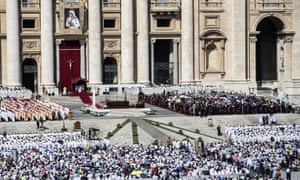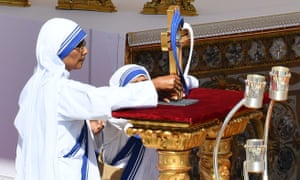Hundreds of thousands of people have gathered in St Peter’s Square in the Vatican to witness the canonisation of Mother Teresa, the Catholic icon revered around the world for her work with the poor and dying.
The canonisation mass, led by Pope Francis, took place under a huge portrait of the Albanian nun, who established the Missionaries of Charity order in Kolkata in 1950. The order now runs 758 homes, hospices and shelters in 139 countries around the world.
Nuns – some wearing the distinctive blue and white robes of Mother Teresa’s order – priests, pilgrims and tourists crammed into the square in front of St Peter’s Basilica for the two-hour ceremony.
Police officers and volunteers in yellow tabards and baseball caps marshalled the crowds between crash barriers, and Red Cross workers handed out bottles of water. Dignitaries in attendance included a 100-strong delegation sent by the Indian government.
About 1,500 homeless people in Italy were given seats of honour at the celebration, which was to be followed by a pizza lunch served by 250 nuns and priests of the Sisters of Charity order on the orders of the pope.
During the canonisation ceremony, Cardinal Angelo Amato read a brief description of Mother Teresa’s work before asking the pope to canonise her.
Francis responded: “After due deliberation and frequent prayer for divine assistance, and having sought the counsel of many of our brother bishops, we declare and define Blessed Teresa of Calcutta to be a saint and we enrol her among the saints, decreeing that she is to be venerated as such by the whole church.”

In his homily, Francis described Mother Teresa as an “emblematic figure of womanhood” and a “tireless worker for mercy”. He told the crowd: “May she be your model of holiness.”
In an unscripted comment, he added that many people would have difficulty in referring to her as Saint Teresa. “I think we’ll carry on calling her Mother Teresa.”
In India, a special mass was celebrated at the Missionaries of Charity.
Among the crowds in Rome was Paul Spiteri, 69, who had travelled from Malta for the ceremony. Handing out Mother Teresa prayer cards, he said he had met the nun four times and was thrilled to witness her being made a saint. “This is a very special moment,” he said.
Shamini Chakupurayil, 19, from Kerala, said Indian Catholics were especially proud of Mother Teresa’s life and work. “This is the best day of my life,” she said.
Holding his seven-month old daughter Georgiana under the shade of an umbrella, Francis Gojcaj, an American of Albanian heritage, said Mother Teresa had “given her whole life to the poor. She has a special place in our hearts.”

But the canonisation also reignited criticism of the Missionaries of Charity, which detractors claim focused on the elevation rather than the relief of suffering.
Critics say inadequate medical care given to sick and dying people was negligible. Syringes were reused without sterilisation, pain relief was non-existent or inadequate, and conditions were unhygienic. Meanwhile, Mother Teresa spent much of her time travelling around the world in a private plane to meet political leaders.
Three years ago a study by academics at the University of Montreal concluded that the Vatican had ignored Mother Teresa’s “rather dubious way of caring for the sick, her questionable political contacts, her suspicious management of the enormous sums of money she received, and her overly dogmatic views regarding … abortion, contraception and divorce.”
Mother Teresa, who was born Anjezë Gonxhe Bojaxhiu in 1910 in what is now Macedonia, was proclaimed a saint almost 19 years to the day after her death in 1997. Conforming with the process of canonisation, two miracles were deemed to have been performed after she died, both involving the alleged cure of terminally ill people.
Mother Teresa was awarded the Nobel peace prize in 1979. She said she did not deserve the award but accepted it “in the name of the hungry, the naked, the homeless; of the crippled, of the blind, of the lepers, of all those people who feel unwanted, unloved, uncared for throughout society”.
–
Source: Guardian UK

